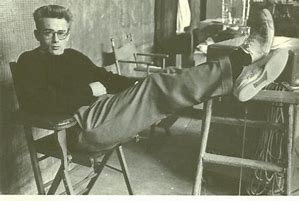Mark*, my radiation oncologist’s medical assistant, was an unlikely member of my Cancer Care team. Spending hours in this specific area in my clinic, I was engulfed with females: female technicians, specialists, nurses and various other support staff. Yeah, it was quite girly. And, with something as personal as female health issues involving breasts and reproductive organs, to a certain extent, I think that’s by design.
Therefore, I was not prepared to encounter an actual guy here within the walls of my Cancer Care Clinic. Mark initially reminded me of those photographs of James Dean, wearing glasses, when he lived In New York City, pre-fame. There was this quiet, non-conformity thing going on with the man.
Quiet Mark, indeed, regularly made contact with me first before I saw my oncologist each week. He’d ask all kinds of health and cancer/mastectomy questions.
However, he really scored points when it came to his compassionate response regarding my anxiety and depression. Touchy stuff here. Yes, this wonderful cancer was making me anxious and depressed, but my abuse experiences and my own infernal fussiness also added to the delightful mix.
“I don’t know if it’s nature or nurture. Believe me, I wish I could be more laid back of a person. I probably have some kind of PTSD.”
Mark responded, “Well, there’s no one here in a place to judge what you’ve been through…”
This response seemed instinctive, like he was scanning my adrenaline levels.
(Was he a Cyborg?)
Later, as I read the bulletin board bios of the Cancer Care staff, perhaps, there was more to it. He was a medic in the military and the thought occurred to me: did he revert to some shell shock triage he administered to soldiers in his care as he dealt with me?
Yes, he was doing his job, but, as time clicked along, week to week, I started noticing a balancing act in his treatment: part compassion, part playful irreverence.
And, as I became more comfortable venting about my radiation and chest experiences, I would hear a soft chuckling, “Oh, Sheryle…”
He extracted the pertinent weekly data, while being professionally playful with me. That’s a difficult thing to master, especially as I’m all TMI about my topless, increasingly burned chest. I bemoaned my difficulty sleeping through the night and how I was gradually becoming a walking, talking sunburn. You know, fun chatter.
But I was confronted with a realization I couldn’t blow off. Over those past months since my diagnosis, I had grown comfortable whining about all of this stuff to any female healthcare professional. So, one could argue, my approach fell under the heading of “girl talk.”
However, with Mark, I had to remind myself several times, “This is a guy, Sheryle. You’re weirding him out and annoying him. Stop it!”
Still, he was unflappable when I was my fussy self.
And that underscores something unique here in this Cancer Care environment. People can often take it for granted that staff members will be female: female doctors, female nurses, female technicians, especially with Breast cancer.
But with Mark in that domain, the atmosphere shifted. He offered a male perspective, a sensitive one at that, which provided a different safety. He wasn’t overbearing and his wry sense of humor managed to show itself during some scary and vulnerable moments.
(Yes, please distract me from all of the cancer/death stuff, please).
And that helped.
Again, I don’t know how much of it was his military medical triage or how much of it was just him being so darned mild- mannered.
But I did see more than one diagnosed, gown-clad female exhibiting teenage girl giggles, chirping, “Hi, Mark” in the hallways. Maybe they were responding to the “rebel without a cause” thing. But there was less self-consciousness, even in this most self-conscious of settings. It was diagnosed and irradiated ladies feeling more at ease.
That transcended James Dean. I believe they saw an ally in him, just like I did.
*(Not his real name).
Copyright © 2019 by Sheryle Cruse







Read 0 comments and reply